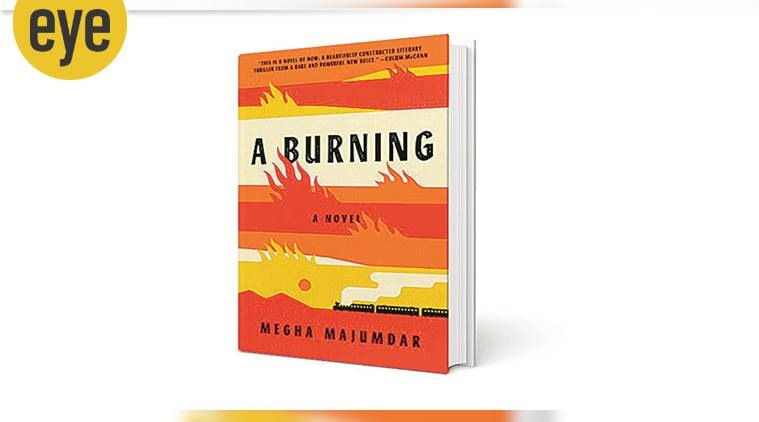 A Burning, by Megha Majumdar; Alfred A Knopf/Penguin Hamish Hamilton; 304 pages; Rs 599
A Burning, by Megha Majumdar; Alfred A Knopf/Penguin Hamish Hamilton; 304 pages; Rs 599
To start with, the name of her protagonist. Jivan is the only daughter of an impoverished Muslim couple, whose names we are never told. Nor the circumstances in which they chose an oddly-north-Indian/Hindu sounding name for their daughter. They live in a slum near a landfill in a city which is probably Kolkata, having been displaced from their village by a development project. Despite the grim odds, Jivan catches a few breaks – admission to a private school under a quota for the underprivileged and, later, a job at Pantaloons – and is working her way to her dream of a middle-class life. She is the poster girl of “modern” Indian aspiration, whose promise and discontents have been the subject of novels like Vikas Swarup’s Q&A (2006) and Aravind Adiga’s White Tiger (2008).
Jivan tells us her story in the first person, unmediated by the authorial voice – though the novel turns on the irony that the marginalised are never in control of their narratives. In a moment of weakness, Jivan gives in to the buzzing energy of social media outrage – “Wasn’t this a kind of leisure dressed up as agitation?” – and writes on Facebook in the aftermath of a blast on a train: “If the police watched them die, isn’t the government also a terrorist?” Jivan is arrested, accused of sedition and conspiracy.
Two other voices and narratives interleave with Jivan’s. PT Sir, the physical education teacher at her school, who is weaned away from a humdrum existence by the machismo of right-wing politics. Lovely is a transwoman with Bollywood dreams, ready to pit her formidable life force and abundant humour against all those who wish to hold her back. While PT Sir’s arc is narrated in third-person, Lovely speaks in a singsong, ungrammatical present continuous tense, making the reader look at her askance even in her most vulnerable moments – marking out her “difference” in a way that is borderline disrespectful. Even so, she remains the most well-realised of the characters.
Majumdar is an assured writer, with a firm control on plot, an enviable restraint of expression and a trust in brevity that is an obvious talent. Lean, spare sentences come up with the telling detail, short chapters propel the plot-driven narrative. Recalling a portrait of her in the courtroom, Jivan says, “The sketch shows a woman with her hair in a braid…The rest of the body is hastily pencilled, decaying already.”
In the schematic structure of the novel, two marginalised voices intersect with the voice of a savarna man, gently asking readers to see a larger architecture of inequality. In between are scattered interludes – an allusion to gau rakshaks, the working class’s fascination with the mall, the power of religious charlatans – that strive to thicken the texture of the novel’s realism but come off as an attempt to tick the boxes of a “new India” novel. Even the lynching of a Muslim man by a mob is like an unexplained bolt of lightning.
Majumdar’s economy of style and language extends, unfortunately, to an economy of specificities and details – one that produces an attenuated version of the complex, violent remaking of India, a version that is evidently easier on Western critics and publishing cultures. It is not a coincidence that Majumdar’s prose is often interrupted by jarring annotations: a “puchka wallah is a seller of spiced potato stuffed in crisp shells”; a shingara is “pastry filled with spiced potatoes and peas”. (One might have thought that Indian writing in English had fought and won these battles long ago.) Even the setting could be just any metropolis in India, unlike, say, the Delhi that shines through in another recent novel, Deepa Anappara’s Djinn Patrol on the Purple Line.
A Burning allows us to see Jivan almost entirely as an individual, without the cushion of a collective cultural or religious identity, whether as a Bengali or a Bengali Muslim; more significantly for the political intent of the novel, there is no allusion to any experience of Islamophobia. The Hindutva politics that stalks India’s minorities and dissenters – the word Hindu is not mentioned in the novel – remains the evil which cannot be named.
What cannot be named also cannot be fought. That, perhaps, explains the bleak, unremitting trajectory of the novel in the end, in which no one puts up a fight for Jivan, and she is completely forsaken. It reminded me of the first half of Hindi cinema’s many morality-tale-like revenge dramas, before the hero intervenes to right an impossibly corrupt system. The denouement’s many elements – the betrayal of the corrupt journalist, the unreasonably swift and harsh court judgment – end up draining Jivan’s character and turning her into a rag-doll victim.
The tyranny of news and politics on the human mind has never been more oppressive, but it is in art and fiction that one might hope to find catharsis and meaning, and not merely an anthropological reflection of changing societies. Enclosed in a prison, Jivan says, “Looking at me, you might think I have become a servant, but that is true only of hands. In my mind, I have resisted being imprisoned.” That is the promise of Majumdar’s novel, but one that it fails to fulfill.